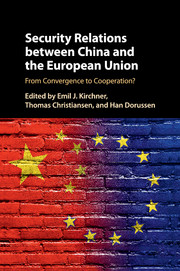Book contents
- Frontmatter
- Dedication
- Contents
- List of Tables
- Preface and Acknowledgements
- Abbreviations
- List of Contributors
- 1 EU–China Security Cooperation in Context
- 2 Chinese and EU Views of Military Security: Crafting Cooperation
- 3 Regional Solutions for Regional Confl icts? The EU, China and their Respective Neighborhoods
- 4 Aims versus Deeds: EU–China Cooperation in Nuclear Nonproliferation
- 5 Terrorism and Organized Crime: Common Concerns but Different Interests
- 6 Chinese and EU Climate and Energy Security Policy
- 7 Competing or Converging Claims on International Order? The EU, China and Human Security
- 8 Civil Protection: Identifying Opportunities for Collaboration
- 9 Cybersecurity and EU–China Relations
- 10 The Economic Security Dimension of the EU–China Relationship: Puzzles and Prospects
- 11 Is Securitizing Migration a Mandatory Choice? Lessons from the EU and China
- 12 Against the Odds: (Considerable) Convergence and (Limited) Cooperation in EU–China Security Relations
- Index
- References
1 - EU–China Security Cooperation in Context
Published online by Cambridge University Press: 05 September 2016
- Frontmatter
- Dedication
- Contents
- List of Tables
- Preface and Acknowledgements
- Abbreviations
- List of Contributors
- 1 EU–China Security Cooperation in Context
- 2 Chinese and EU Views of Military Security: Crafting Cooperation
- 3 Regional Solutions for Regional Confl icts? The EU, China and their Respective Neighborhoods
- 4 Aims versus Deeds: EU–China Cooperation in Nuclear Nonproliferation
- 5 Terrorism and Organized Crime: Common Concerns but Different Interests
- 6 Chinese and EU Climate and Energy Security Policy
- 7 Competing or Converging Claims on International Order? The EU, China and Human Security
- 8 Civil Protection: Identifying Opportunities for Collaboration
- 9 Cybersecurity and EU–China Relations
- 10 The Economic Security Dimension of the EU–China Relationship: Puzzles and Prospects
- 11 Is Securitizing Migration a Mandatory Choice? Lessons from the EU and China
- 12 Against the Odds: (Considerable) Convergence and (Limited) Cooperation in EU–China Security Relations
- Index
- References
Summary
The purpose of this chapter, and of the book as a whole, is to explore EU–China security relations, which have hitherto received scant attention in the writings on EU–China relations. This involves an empirical exercise of studying a number of security dimensions, through a number of heuristic orientations, structural interests and normative considerations. The purpose of these framing devices is to provide common elements of analysis to inform the following empirical chapters, rather than constitute a tight framework leading to systematic application.
EU–China security cooperation may appear tenuous and of little significance when seen next to the substantial amount of trade and other forms of economic cooperation between the two sides. Nevertheless, it is a topic of steadily rising importance, not only because economic and security concerns are becoming increasingly intertwined, but also as nontraditional security threats become more pronounced in international relations. Indeed, aside from economic interdependence, other factors affect the incidence of security cooperation between China and the EU. On the one hand, neither the EU nor China considers the other side as a potential enemy or a military threat – though the nondemocratic nature of the Chinese regime and its maritime territorial disputes continue to be viewed with suspicion by EU policymakers and public opinion (Casarini 2012: 4; Keohane et al. 2014). Instead, both China and the EU support a multipolar international order, and both adopt multilateralism as a key element of their foreign policy, albeit with differences in its practical application.
On the other hand, the EU and China have very different attitudes to key principles of inter-state relations such as state sovereignty, nonintervention and the territorial integrity of states. Furthermore, democratic aspirations and other normative concerns such as the rule of law or good governance matter for the EU in a way that they do not for China. More fundamentally, the fact that the EU is not a state carries with it limitations regarding the cohesion of its security policy, with security and defense policy remaining largely the prerogative of member states. The absence of a distinct EU military presence in Asia and the NATO membership of most EU countries diminish EU attractiveness as a genuine (independent) security actor in its dealings with China.
- Type
- Chapter
- Information
- Security Relations between China and the European UnionFrom Convergence to Cooperation?, pp. 1 - 18Publisher: Cambridge University PressPrint publication year: 2016
References
- 1
- Cited by

